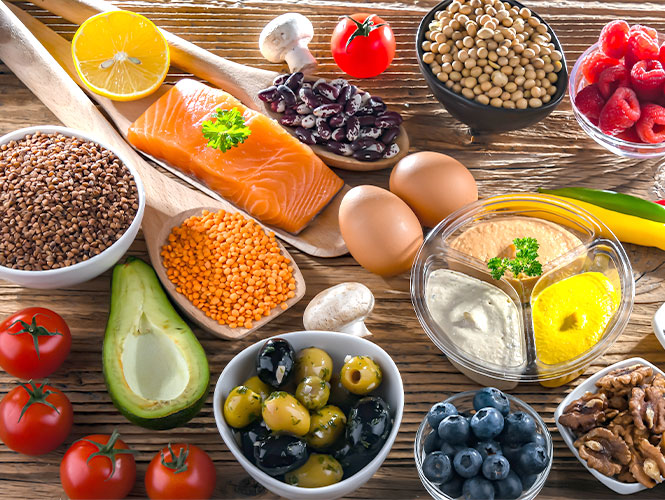System Dialog

The Mediterranean Diet is named for the region near the Mediterranean Sea, encompassing the countries of Greece, Spain, Italy, and Crete. The Mediterranean Diet emphasizes fruits, vegetables, whole grains, beans and legumes, nuts and seeds, olive oil, fish and seafood, moderate amounts of poultry and dairy products and limits red meat, sodium and added sugars.
Often considered one of the healthiest diets in the world for the low rates of heart disease, diabetes, certain cancers, and other chronic diseases observed in these regions compared with other parts of the world. There are no prohibited foods in this style of eating and it could be more accurately described as the Mediterranean lifestyle than diet. This eating style is high in fiber, vitamins, and minerals and low in saturated fat, cholesterol and added sugar with a focus on natural sweetness from fruit.
With a predominant focus on fruits, vegetables, legumes and whole grains, The Mediterranean Diet is rich in vitamins, minerals, antioxidants, and fiber in which the typical American diet is lacking.
• Fruits and vegetables can be fresh, frozen, or canned
• Look for varieties with no added sugar, salt, or fat
Fresh: Leafy greens, cabbage, tomatoes, cucumbers, bagged salads, ShortCuts fruit cups, ShortCuts vegetables, and broccoli.
Frozen: Food Club stew vegetables, Pictsweet Farms vegetables for grilling, Food Club Steamin’ Easy mixed vegetables, mixed berries, and tropical smoothie blend.
Canned: Food Club mixed vegetables, whole tender baby carrots, 100% pumpkin, no salt added green beans, and mandarin oranges in 100% juice.
The Mediterranean prioritizes whole grains instead of refined grains as a staple in meals. Whole grains have the whole package, which means more fiber, vitamins, and minerals.
• Include oatmeal, brown rice, barley, whole-wheat pasta, and pasta to meals
• Snack on air-popped popcorn and whole-grain crackers
Bread: Nature’s Own 100% whole wheat bread, Pepperidge Farm 100% whole grain bread, Dave’s Killer Organic 100% whole wheat bread, Arnold 100% whole wheat bread, Toufayan whole wheat pita, and Mission whole wheat tortilla.
Cereal: Food Club Honey & Oats Cereal with Almonds, Post Grape Nuts, Post Shredded Wheat Big Biscuit, and Full Circle Market Bran Flakes.
Pasta & Other Grains: Full Circle Market whole wheat penne, Full Circle Market whole wheat spaghetti, Full Circle Market quinoa, Full Circle Market brown basmati rice, Minute brown & wild rice, and Birds Eye whole grain brown rice.
The Mediterranean style incorporates plenty of plant-based protein sources, from lentils, beans, nuts, and seeds. Plant protein sources tend to be lower in total and saturated fat and add additional fiber, vitamins, and minerals.
• Look for varieties lower in sodium.
• For canned beans and lentils, drain and rinse to remove thirty percent of the sodium.
Beans & Lentils: Food Club black beans, Full Circle Market red or green lentils, Food Club cannellini beans, Bush’s Best sidekicks, Luck’s chili beans, and Food Club frozen edamame.
Soy & Meat Alternatives: Nasoya firm tofu, Barilla chickpea rotini, and Barvecue original BVQ.
The Mediterranean Diet is rich in healthy fats, with olive oil being the staple source. Nuts and seeds are another regular part of this eating plan.
• Look to replace saturated fats, like butter and cream, with oils that are liquid at room temperature, especially olive oil when cooking.
• Look for salad dressings made with olive oil, lemon or vinegar and fresh herbs.
• Snack on unsalted nuts and seeds.
Oils: Extra virgin olive oil, and Avocado oil
Nuts and Seeds: Unsalted cashews, raw almonds, flaxseed, chia seeds, unsalted mixed nuts, and pistachios.
Fruits: Avocado and olives
Animal proteins are enjoyed in moderation with a higher emphasis on fish and lower intake of red meats in this eating plan.
* Eat at least two servings of fish and seafood per week, especially varieties rich in omega-3 fatty acids, like salmon, herring, and mackerel.
* Choose plain yogurt and add fruit to sweeten.
Limit red meat to one serving per week.
Dairy & Eggs: Food Club Plain whole milk Greek yogurt, whole eggs, and Lifeway unsweetened kefir.
Fish & Seafood: Fresh salmon filets, Food Club Chunk light tuna in water or olive oil, Food Club pink salmon, Full Circle Market frozen Atlantic sockeye salmon, and Full Circle Market cooked shrimp.
Red wine is commonly enjoyed as part of dinner meals in a Mediterranean style of eating, though it is not recommended to start drinking alcohol if you do not already. If choosing to drink wine, moderate consumption is recommended.
• Women should consume no more than 1 4-ounce glasses per day
• Men should consume no more than 2 4-ounce glasses per day
Hello! How can I help you today?